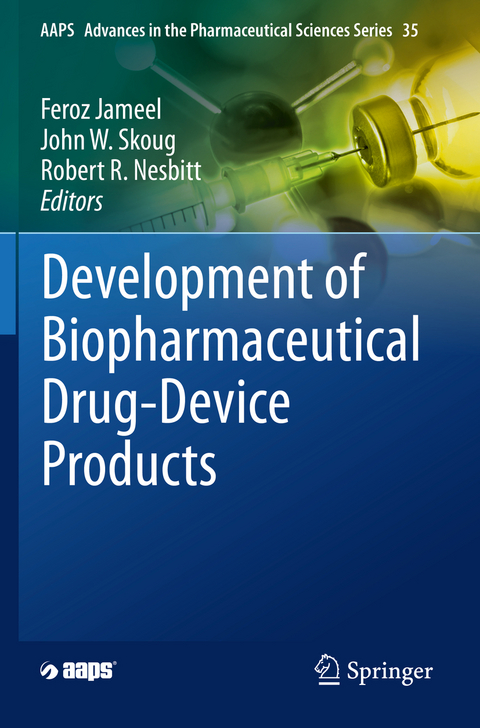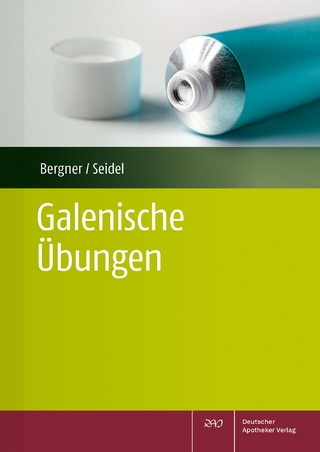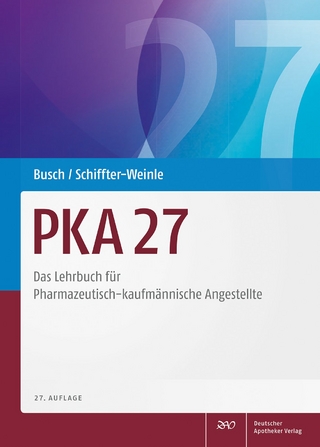
Development of Biopharmaceutical Drug-Device Products
Springer International Publishing (Verlag)
978-3-030-31417-0 (ISBN)
Feroz Jameel heads the formulation development function of New Biological Entities at AbbVie, Lake County, IL, where he is involved in early and late stage development of parenteral products. Prior to joining AbbVie, Feroz worked at Baxter Biosciences and Amgen. At Baxter, Feroz was involved in the end-to-end development and tech transfer of recombinant Factor VIII (RecombinateTM). At Amgen, Feroz worked over several years in the Parenteral Delivery Drug Product and Process Development where he was involved in the drug product development and tech transfer of several parenteral products including Enbrel®, Nplate®, Repatha® and Blincyto®. Feroz received his Master's degree in Pharmaceutics from the University of Delhi and Ph.D. in Pharmaceutics (Pharmaceutical Sciences) from the University of Connecticut. His publications include over 20 peer-reviewed manuscripts, over 20 presentations, and several book chapters. He is the co-editor of the books "Formulation and Process Development Strategies for Manufacturing of Biopharmaceuticals" and "Quality by Design for Biopharmaceutical Drug Product Development". He has held several leadership positions at the AAPS including chair of "Freezing and Drying Technologies" and led the industrial consortium for Lyo QbD. Currently, he is leading the industrial consortium on "Best practices/guidelines for validation of Lyophilization process and products". He is a recipient of 2 patents in lyophilization formulation and lyophilization process development. In addition to corporate awards, Henry Kramer from Baxter and Volwiler Award from AbbVie, Feroz received several awards including the AAPS and PDA's Fred Simon's award for the best paper published in the PDA Journal of Pharmaceutical Science and Technology. He has also chaired several symposia on the development of biological products. John Skoug has more than 30 years of pharmaceutical industry experience and specializes in CMC product development across all stages of discovery and development. Through early 2019, he was Senior Director in AbbVie's drug product R&D organization, where he held a number of roles including head of preformulation, solid-oral formulation development, drug/device combination product development and CMC program management. In these roles, he was responsible for CMC technical strategy and execution for small molecule programs and combination product programs for biologics. Prior to AbbVie, John held similar scientific and leadership positions in Pharmaceutical R&D in Upjohn/Pharmacia/Pfizer. John founded FarmCMC LLC in 2019 to leverage his technical and leadership expertise to help small and medium sized biopharmaceutical companies develop novel therapeutic assets and delivery systems through early and late stage development. John received a Ph.D. in Analytical Chemistry from Purdue University, has more than 20 publications and presentations, and has served in various capacities with the American Association of Pharmaceutical Scientists, the Combination Product Coalition, and the IQ Consortium, where he was recognized with the Outstanding Service award in 2015.
Robert Nesbitt is a group leader in Human Factors and Drug Delivery System development in AbbVie's Combination Product Development group in Lake County, IL. Bob has a BS in Engineering Operations from Iowa State University, and an MBA from the University of Chicago. He joined AbbVie in January 2015, after 16 years at Eli Lilly and Company, where he drove patient-centered design into device development, and where he supported the design and launch of nine different Lilly devices still in use today around the world. Prior to Lilly, Bob led process engineering and manufacturing for both Roche Diagnostics' blood glucose monitoring and Baxter Healthcare's Custom Sterile Procedure pack businesses. He has been active in the development of ISO standards for medical devices sin
Foreword.- Preface.- Introduction.- Section I Background of Structure and Function of Engineered Antibiodies.- Monoclonal Antibodies.- Antibody Drug Conjugates (ADCs), DVDs, BiTES (Bispecfic T Cell Engagers).- Section II Early Stage Analytical, Molecular Assessment and Formulation..- Leveraging the Multi-Attribute Method (MAM) to Improve Biotherapeutic Characterization.- Addressing Product Heterogenetity in ADC Biotherapeutics: Case Studies.- Cutting-Edge Analytical and Structural Methods for Characterization of ADCs.Cutting edge LC and CE-MS Methods for mABs, ACDs, and Bispecfic Antibodies.- Incorporation of Developability, Manufacturability in Therapeutic Antibody Discovery.- Analytical Characterization of Biologics for Candidate Selection and Optimization: Strategies and Case Studies.- Developability Assessment of Bispecific Antibodies: Analytical Platform and Stability Studies.- Method Development and Qualification and Molecular Assessment - Screening for Drug-like properties of DVDs/ADCs.- Solubility and Early Assessment of Stability for Protein Therapeutics (In general and with specific case studies with modalities Duobody).- Screening Antibody Candidates (mAbs) for Manufacturability, Stability, and Deliverability.- Practical Considerations in Screening Excipients for Protein Drugs.- Highly-Automated Procedures for the Assessment of Protein Formulations.- Formulation Design for Biologics in the Age of Lab Automation and Biological Performance Screening.- Pushing Formulation Development into Discovery through Antibody Design and High-Throughput Screening.- An Empirical Phase Diagram/ High Throughput Screening Approach to the Characterization and Formulation of Biopharmaceuticals.- Development of a combination drug product for high protein concentration mAbs: Preformulation, formulation and device - A case study with delivery system.- Formulation and Process development of ADC Drug Products -A Case Study.- Formulation and Device Development Strategies for Fusion Protein, A case study.- Development of a combination drug product for BITEs: Pre-formulation, Analytics, formulation and device - A case study.- Challenges in the Development of Pre-filled Syringes with Device for Biologics from a Formulation and device Points of View.- Section III Process Development.- Scale Down Models for Robust Biologics Drug Product Development.- Engineered antibodies -Understanding Intricacies of Formulation and Freeze Thaw Process.- Development and Scale-up of a Commercial Filtration Process.- Filling of High-Concentration Monoclonal Antibody Formulations: Investigating Underlying Mechanisms Impacting Precision of Low Volume Fill by Peristaltic Pump.- Development and Optimization of Freeze drying Process for Engineered antibodies - Case studies.- Section IV Drug Delivery and Device Development .- Considerations for developing a Biologic in a PFS.- Early Device and Container Closure System Evaluation - A case study for Cartridge.- Prefilled Syringe Technologies for Improving Drug Stability and Reliable Plunger Performance for Auto-Injectors Applications.- Global Market Trends for Advanced Combination Products -How Innovations can Contribute to Better Patient Outcomes.- Patient Centricity and System Integration as New Drivers of Biologic Drug Product Design Strategy.- Drug Delivery and Device Development,. A case study.- Development of a Combination Product : A Case Study.- Development Activities Associated with a One-Way Label Reference for a Device for Clinical Use.- Infusion set compatibility and drug delivery challenges of high potency ADCs.- Glossary.- Index.
| Erscheinungsdatum | 29.03.2021 |
|---|---|
| Reihe/Serie | AAPS Advances in the Pharmaceutical Sciences Series |
| Zusatzinfo | XVIII, 893 p. 302 illus., 256 illus. in color. |
| Verlagsort | Cham |
| Sprache | englisch |
| Maße | 155 x 235 mm |
| Gewicht | 1354 g |
| Themenwelt | Medizin / Pharmazie ► Pharmazie ► PTA / PKA |
| Naturwissenschaften ► Chemie ► Technische Chemie | |
| Technik | |
| Schlagworte | biotherapeutics • Bispecfic Antibodies • combination drug-device products • Combination Drug product • drug discovery • engineered anitbodies • Molecular assessment and preformulation • monoclonal antibodies • Multi-attribute Method (MAM) • Multi-attribute Method (MAM) • New modalities, mAbs, ADC, Bites, CAR-T, DVD, Dualbodies, mRNA • Protein therapeutics • Screening Excipients • Screening Excipients • Therapeutic Antibody Discovery |
| ISBN-10 | 3-030-31417-0 / 3030314170 |
| ISBN-13 | 978-3-030-31417-0 / 9783030314170 |
| Zustand | Neuware |
| Informationen gemäß Produktsicherheitsverordnung (GPSR) | |
| Haben Sie eine Frage zum Produkt? |
aus dem Bereich


